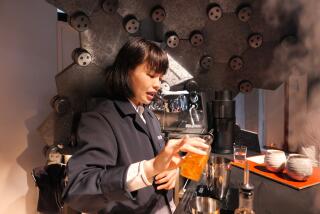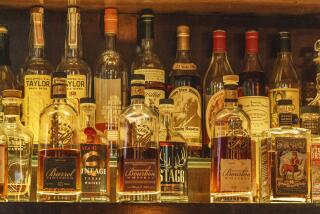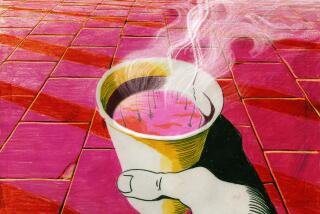Pricey Premium Coffee Is No Ordinary Cup of Joe
- Share via
GREEN HILLS, Jamaica — Wine lovers revere the best vintages and are more than willing to pay top dollar for bottles from exclusive chateaux.
Alex Twyman wants to convince coffee drinkers his “estate coffee” deserves the same respect--and premium prices.
Cultivated and processed at his farm in Jamaica’s Blue Mountains, Old Tavern brand coffee is aimed at connoisseurs who want a robust flavor--some say woody, others nutty--and a deep, intriguing aftertaste.
“Our coffee is meant to be enjoyed after a fine meal, maybe with a cigar--not as a morning pick-me-up,” Twyman says, his blue eyes aglow as he looks over his lush 100-acre farm from a high mountain perch. “It’s nurtured on the tree, raised with loving and care and roasted on the farm.”
With the success of Starbucks and other coffee chains showing the demand for high-end brews, Twyman’s new approach has industry experts optimistic that discriminating consumers will be opting for exclusive “estate coffees.”
“Twenty years ago the commercial coffees, the Maxwell Houses, were really bad, but there was a small fraction of coffee producers making a stronger, more flavorful cup. That industry has just taken off,” says Jane McCabe, editor and co-publisher of the New York-based Tea & Coffee Trade Journal. “The next step is estate coffee.”
Twyman’s niche is exclusive, to be sure. He harvests 40,000 pounds of beans a year--less than 2% of the coffee grown in the Blue Mountains and barely a sliver of the 14 billion pounds produced worldwide last year.
But his customers pay more than $50 for a pound, making Old Tavern among the most costly of coffees. Its price is almost double that of Jamaican beans sold under the generic Blue Mountain label.
A 68-year-old London native, Twyman made Jamaica his home in the 1950s, when it was still a British colony. He began planting coffee trees in 1969, back when he “didn’t know a coffee tree from an orange tree.”
He learned that the moist, cool climate and often cloudy weather of the Blue Mountains lengthens the growing period from five to 10 months, allowing sugars in the beans to develop.
By the mid-1970s, coffee became an obsession. Twyman, who was also working as a surveyor, began selling fresh “cherries” to the government-owned Coffee Industry Board, the decision-making body in the tight-knit, secretive Jamaican coffee industry and exporter of Blue Mountain coffee.
Twyman concluded that the generic label--grown by thousands of people at a variety of elevations and climates--produced inconsistent flavor.
He began fighting the coffee board for the right to sell his own roasted coffee, an uphill struggle he attributes to a “coffee mafia” that feared losing control.
Coffee board officials say they were worried about quality and the economic viability of the business. They also deny that generic Blue Mountain coffee has inconsistent flavor.
Then the International Monetary Fund came to Twyman’s rescue. It demanded in 1983 that Jamaica open up the coffee business as part of general economic reforms, and the board eventually began granting licenses for roasting and exporting operations.
In 1997, Twyman become one of just two growers--the other is a company called RSW Estate--licensed to handle the entire process.
“I can control the growing, the processing, the roasting, and it’s consistent,” Twyman says.
Partly because of his success, more estate license applications are expected, said C.A. Goodridge, the coffee board’s chief regulator.
Twyman cannot control the coffee all the way to the cup, of course. But he has some advice for consumers.
“We don’t sell ground coffee because within four minutes of grinding it loses 40% of its aroma and 40% of its flavor. If someone can afford to buy our coffee, they can afford to buy a coffee grinder,” he says.
Twyman’s recommendation: an espresso machine with half the amount of coffee used for making espresso, and double the water. “That way you get a clear cup of wonderful coffee,” he says.
*
On the Net:
Tourism Board coffee page:
https://www.bluemountaincoffee.com
Blue Mountain Coffee Distributors:
https://www.1wms.com/jbmcoffee.htm
More to Read
Eat your way across L.A.
Get our weekly Tasting Notes newsletter for reviews, news and more.
You may occasionally receive promotional content from the Los Angeles Times.









